GDPR(General Data Protection Regulation)は、ウェブサイトの使用中にユーザーのプライバシーを保護する欧州連合の法律です。
ユーザーから、GDPRを平易な英語で説明し、WordPressサイトをGDPRに準拠させるためのヒントを共有してほしいというメールを数十件受け取りました。
この記事では、GDPRとWordPressについて、複雑な法律用語なしで知っておくべきすべてを説明します。
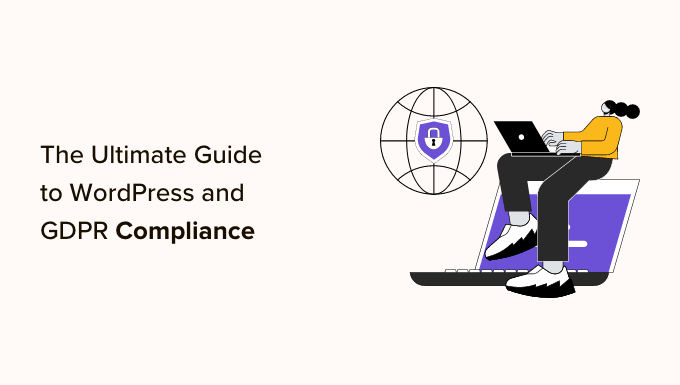
免責事項
私たちは弁護士ではなく、このウェブサイト上のいかなる内容も法的アドバイスとはみなされないものとします。
WordPressとGDPR準拠に関する究極のガイドを簡単にナビゲートできるように、以下の目次を作成しました。
- GDPRとは何ですか?
- GDPRは私のWordPressウェブサイトに適用されますか?
- ウェブサイト所有者にGDPRで求められることは何ですか?
- WordPressはGDPRに準拠していますか?
- ウェブサイトのGDPR準拠を確認すべき追加エリア
- GDPR準拠のための最高のWordPressプラグイン
- 最終的な考え
- WordPressサイトをGDPRに準拠させるための専門家ガイド
- 追加リソース
GDPRとは何ですか?
一般データ保護規則(GDPR)は、2018年5月25日に施行された欧州連合(EU)の法律です。GDPRの目標は、EU市民に個人データに対する管理権を与え、世界中の組織のデータプライバシーへのアプローチを変更することです。
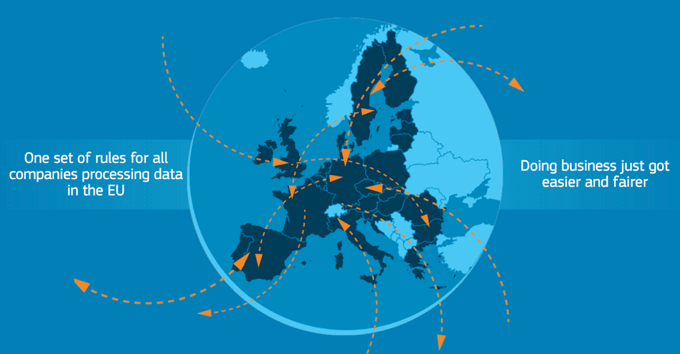
ここ数年、Googleのような企業からGDPR、新しいプライバシーポリシー、その他の多くの法的なことに関するメールを何十通も受け取ったことでしょう。それは、EUが規制に準拠しない者に対して大きな罰則を設けているからです。
GDPRの要件に準拠していない企業は、年間世界売上高の4%または2,000万ユーロ(いずれか高い方)までの高額な罰金に直面する可能性があります。これは、世界中の企業に広範なパニックを引き起こすのに十分な理由です。
CCPAとは何ですか?
カリフォルニア州は2020年1月1日に同様のプライバシー法を導入しましたが、罰金の可能性ははるかに低いです。
カリフォルニア州消費者プライバシー法(CCPA)は、カリフォルニア州の居住者の個人情報を保護するために設計されています。これにより、居住者は自分自身について収集されている個人情報を知る権利、その削除を要求する権利、およびデータの販売をオプトアウトする権利を得られます。
この記事ではGDPRに焦点を当てますが、この記事でリストする多くの手順は、CCPAに準拠するのにも役立ちます。
ここで、皆さんが考えているかもしれない大きな疑問に移ります。
GDPRは私のWordPressウェブサイトに適用されますか?
答えはYESです。これは、欧州連合だけでなく、世界中のあらゆる規模のビジネスに適用されます。
あなたのWordPressウェブサイトに欧州連合諸国からの訪問者がいる場合、この法律が適用されます。
しかし、パニックになる必要はありません。世界の終わりではありません。
GDPRはこれらの高額な罰金につながる可能性がありますが、まずは警告、次に譴責、そしてデータ処理の一時停止から始まります。
そして、法律違反を続けた場合にのみ、多額の罰金が科せられます。
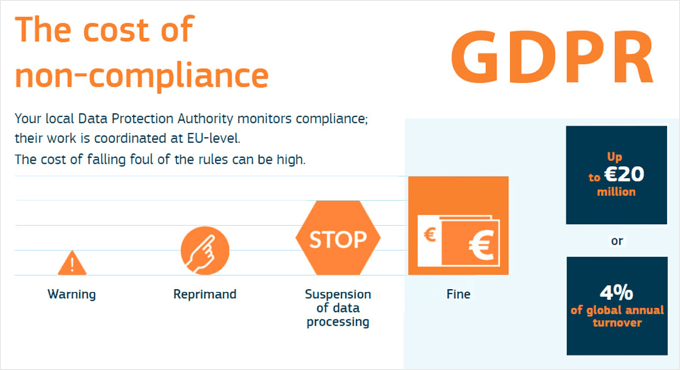
EUはあなたを陥れようとする邪悪な政府ではありません。その目標は、プライバシー侵害につながる可能性のある無謀なデータ処理から無実の消費者を保護することです。
私たちの意見では、最高罰金額は、FacebookやGoogleのような大企業に注目してもらうために、この規制が無視されないように意図されている部分が大きいと考えられます。さらに、これにより企業は人々の権利保護により重点を置くようになります。
GDPRで何が求められているのか、そして法律の精神を理解すれば、これらがどれほどクレイジーなものでもないことがわかるでしょう。
WordPressサイトをGDPRに準拠させるためのツールやヒントも共有します。
ウェブサイト所有者にGDPRで求められることは何ですか?
GDPRの目標は、ユーザーの個人識別情報(PII)を保護し、企業がこのデータを収集、保存、使用する方法に関して、より高い基準を設けることです。
この個人データには、ユーザーの名前、メールアドレス、物理的な住所、IPアドレス、健康情報、収入などが含まれます。
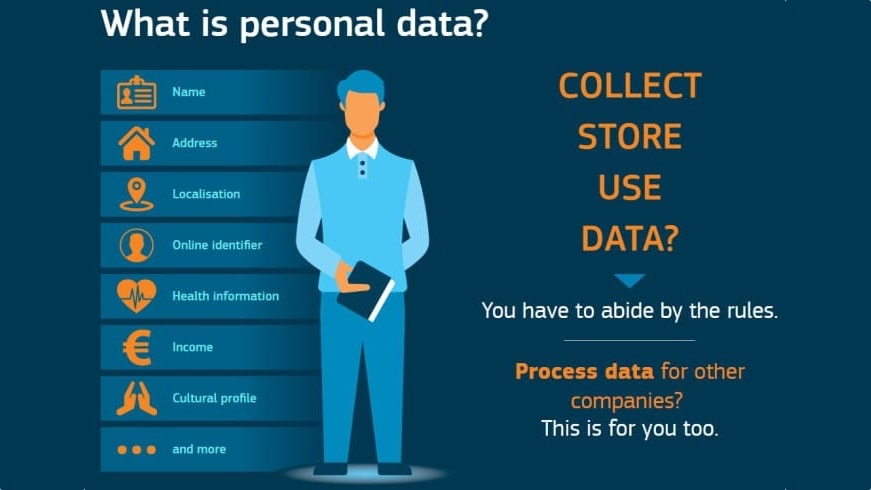
GDPR規制は200ページに及びますが、知っておくべき最も重要な柱は次のとおりです。
個人情報を収集するには、明示的な同意を得る必要があります
EU居住者から個人データを収集している場合は、明示的、具体的、かつ曖昧さのない同意または許可を得る必要があります。
言い換えれば、名刺をくれた人やウェブサイトの問い合わせフォームに記入した人に、一方的にメールを送信することはできません。これはスパムです。代わりに、マーケティングニュースレターへのオプトインを許可する必要があります。
明示的な同意と見なされるためには、積極的なオプトインを要求する必要があります。チェックボックスはデフォルトでチェックされておらず、明確な文言(法律用語ではない)を含み、他の利用規約とは別に記載する必要があります。
ユーザーは個人データに対する権利を持っています
個人がどこで、なぜ、どのようにデータが処理および保存されているかを通知する必要があります。
個人は、個人データをダウンロードする権利と忘れられる権利を持っています。
これは、ユーザーが個人データの削除を要求する権利があることを意味します。ユーザーが購読解除リンクをクリックしたり、プロフィールを削除するように要求した場合、実際に行う必要があります。
データ侵害の通知を迅速に提供する必要があります
組織は、侵害が無害であり個人データへのリスクがないと見なされない限り、特定の種類のデータ侵害を72時間以内に管轄当局に報告しなければなりません。
ただし、侵害のリスクが高い場合は、企業は影響を受ける個人にも直ちに通知する必要があります。
これにより、買収まで明らかにされなかったYahooのような隠蔽が防止されることを願っています。
データ保護官の任命が必要になる場合があります
公開会社である場合、または大量の個人情報を処理する場合は、データ保護担当者を任命する必要があります。
中小企業にはこれは必要ありません。不明な場合は弁護士に相談してください。
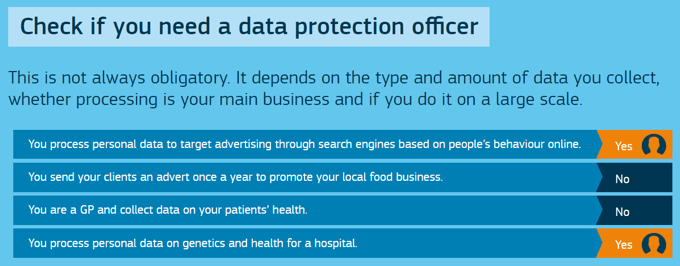
求められていることの平易な英語での要約
平易な英語で言うと、GDPRは、企業が求めていないメールを送信して人々をスパムできないようにします。また、企業は明示的な同意なしに人々のデータを販売することもできません。
企業は、要求があった場合にユーザーのアカウントを削除し、メールリストから購読解除する必要があります。また、企業はデータ侵害を報告し、全体的にデータ保護についてより注意を払う必要があります。
理論上は、かなり良いように聞こえます。
しかし、おそらくWordPressサイトがGDPRに準拠していることを確認するために何をする必要があるのか疑問に思っているでしょう。
さて、それはあなたの特定のウェブサイトに大きく依存します(これについては後ほど詳しく説明します)。
まず、ユーザーから寄せられた最大の質問にお答えしましょう。
WordPressはGDPRに準拠していますか?
はい、WordPressのコアソフトウェアは、2018年5月17日にリリースされたWordPress 4.9.6以降、GDPRに準拠しています。これを達成するために、いくつかのGDPR強化が追加されました。
WordPressについて話すとき、セルフホスト型のWordPress.orgのことを指していることに注意することが重要です。これはWordPress.comとは異なり、WordPress.com vs. WordPress.orgに関するガイドでその違いを学ぶことができます。
とはいえ、ウェブサイトは動的な性質を持っているため、単一のプラットフォーム、プラグイン、またはソリューションが100%のGDPRコンプライアンスを提供できるわけではありません。GDPRコンプライアンスのプロセスは、お持ちのウェブサイトの種類、保存しているデータ、サイトでデータをどのように処理するかによって異なります。
さて、これは平易な英語でどういう意味か、と思っているかもしれませんね。
さて、デフォルトで、WordPressには以下のGDPR強化ツールが付属しています。
コメント同意チェックボックス
2018年5月より前は、WordPressはデフォルトで、コメント投稿者の名前、メールアドレス、ウェブサイトをユーザーのブラウザにクッキーとして保存していました。これにより、これらのフィールドが事前入力されていたため、ユーザーがお気に入りのブログにコメントを残しやすくなっていました。
GDPRの同意要件により、WordPressではコメントフォームに同意チェックボックスが追加されました。

ユーザーはこのボックスをチェックせずにコメントを残すことができます。ただし、そのたびに名前、メールアドレス、ウェブサイトを手動で入力する必要があります。
ヒント: チェックボックスが表示されているかテストする際は、ログアウトしていることを確認してください。
チェックボックスがまだ表示されない場合は、テーマがデフォルトのWordPressコメントフォームを上書きしている可能性が高いです。以下は、WordPressテーマにGDPRコメントプライバシーチェックボックスを追加する方法についてのステップバイステップガイドです。WordPressテーマにGDPRコメントプライバシーチェックボックスを追加する方法。
個人データのエクスポートと削除機能
WordPressは、サイト所有者にGDPRのデータ処理要件に準拠し、個人データの輸出およびユーザーの個人データの削除要求を尊重するために必要なツールを提供します。
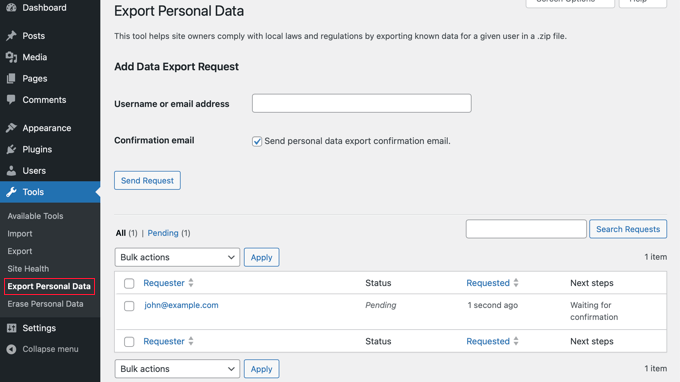
データ処理機能は、WordPress管理画面のツールメニューの下にあります。ここから、個人データのエクスポートまたは個人データの削除を選択できます。
プライバシーポリシー ジェネレーター
WordPressには、組み込みのプライバシーポリシー生成機能が付属しています。既製のプライバシーポリシーテンプレートがあり、追加すべきことに関するガイダンスを提供します。これにより、保存するデータやデータの処理方法に関して、ユーザーに対してより透明性を高めることができます。
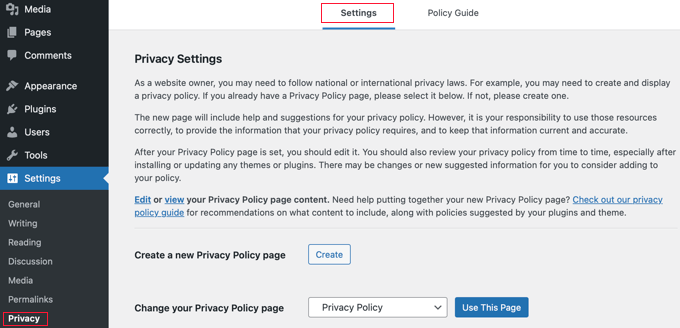
WordPressでプライバシーポリシーを作成する方法に関するガイドで詳細を確認できます。
これらの3つの機能があれば、デフォルトのWordPressブログはGDPRに準拠します。ただし、ウェブサイトには準拠が必要な追加領域があるでしょう。
ウェブサイトのGDPR準拠を確認すべき追加エリア
ウェブサイトの所有者として、データを保存または処理するさまざまなWordPressプラグインを使用している可能性があり、これらはGDPRコンプライアンスに影響を与える可能性があります。一般的な例としては、次のものが挙げられます。
ウェブサイトで使用しているWordPressプラグインによっては、ウェブサイトがGDPRに準拠していることを確認するために、それに応じて対応する必要があります。
多くの優れたWordPressプラグインにGDPR強化機能が追加されました。対応が必要となる一般的な領域をいくつか見ていきましょう。
Google Analytics
ほとんどのウェブサイト所有者と同様に、ウェブサイトの統計情報を取得するために Googleアナリティクスを使用している でしょう。これは、IPアドレス、ユーザーID、Cookie、その他の行動プロファイリングのためのデータなどの個人データを収集または追跡している可能性があることを意味します。
GDPR に準拠するには、次のいずれかを行う必要があります。
- 保存および処理を開始する前に、データを匿名化してください。
- Cookieの通知を行い、トラッキング前にユーザーに同意を求めるオーバーレイを追加します。
サイトにGoogleアナリティクスのコードを手動で貼り付けているだけの場合、これら両方の作業はかなり困難です。しかし、WordPressで最も人気のあるGoogleアナリティクスプラグインであるMonsterInsightsを使用している場合は、幸運です。
彼らは、上記のプロセスを自動化するのに役立つEUコンプライアンスアドオンをリリースしました。

MonsterInsightsには、GDPRとGoogle Analyticsについて説明した非常に優れたブログ記事もあります。サイトでGoogle Analyticsを使用している場合は、必読です。
お問い合わせフォーム
WordPressでお問い合わせフォームを使用している場合、追加の透明性対策が必要になる場合があります。これは、フォームの入力情報を保存している場合や、マーケティング 目的でデータを使用している場合に特に当てはまります。
WordPressフォームをGDPRに準拠させる際に考慮すべき点がいくつかあります。
- ユーザーから個人情報を保存することについて明示的な同意を得てください。
- マーケティング目的(例えば、あなたのメールリストに追加するなど)でユーザーのデータを使用する予定がある場合は、ユーザーから明示的な同意を得てください。
- フォームのCookie、ユーザーエージェント、IPトラッキングを無効にする。
- データ削除リクエストに対応してください。
- SaaSフォームソリューションを使用している場合は、フォームプロバイダーとデータ処理契約を結んでいることを確認してください。
幸いなことに、WPForms、Gravity Forms、またはNinja FormsのようなWordPressプラグインを使用している場合、データ処理契約を締結する必要はありません。
これらのプラグインは、フォームの入力内容をWordPressデータベースに保存するため、GDPRに準拠するには、明確な説明とともに同意チェックボックスを追加するだけで済みます。
WPBeginnerで使用しているコンタクトフォームプラグインであるWPFormsには、GDPR同意フィールドの追加、ユーザーCookieの無効化、ユーザーIP収集の無効化、エントリの無効化をワンクリックで簡単に行えるようにするためのいくつかのGDPR強化機能があります。
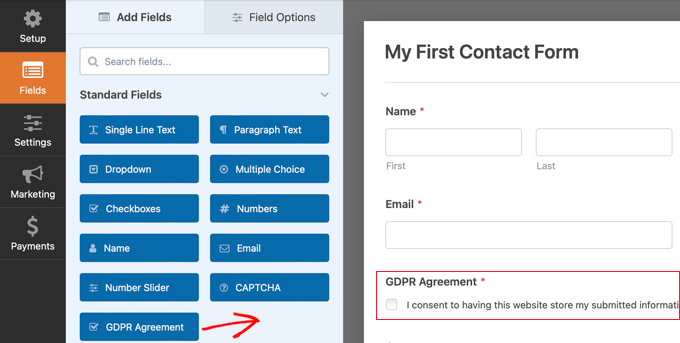
WordPressでGDPR準拠のフォームを作成する方法については、ステップバイステップガイドをご覧ください。
Eメールマーケティングのオプトインフォーム
お問い合わせフォームと同様に、ポップアップ、フローティングバー、インラインフォームなどのメールマーケティングのオプトインフォームがある場合は、リストに追加する前にユーザーから明示的な同意を得る必要があります。
次のいずれかの方法で行うことができます。
- オプトインする前にユーザーがクリックする必要があるチェックボックスを追加します。
- 単純に、あなたのメールリストにダブルオプトインを要求してください。
OptinMonsterのようなトップのリードジェネレーションソリューションは、GDPR同意チェックボックスやその他の必要な機能を追加して、Eメールオプトインフォームを準拠させるのに役立ちます。
OptinMonsterブログで、マーケター向けのGDPR戦略について詳しく読むことができます。
EコマースおよびWooCommerceストア
WordPressで最も人気のあるeコマースプラグインであるWooCommerceを使用している場合は、ウェブサイトがGDPRに準拠していることを確認する必要があります。
幸いなことに、MonsterInsightsチームは、WooCommerceストアをGDPRに準拠させる方法に関する詳細なガイドを用意しました。
リターゲティング広告
ウェブサイトでリターゲティングピクセルまたはリターゲティング広告を実行している場合は、ユーザーの同意を得る必要があります。
WPConsentのようなプラグインを使用することで、これを行うことができます。これは、単に警告を表示するだけの基本的なクッキー通知とは異なり、ユーザーが許可を与えるまですべてのトラッキングスクリプトをブロックします。

このプラグインは、Google AnalyticsやFacebook Pixelのような人気のサービスを処理しながら、詳細な同意記録を保持するため、マーケティングキャンペーンを完全に準拠していることを確認しながら実行できます。
GDPR/CCPAに対応したWordPressのクッキーポップアップの追加方法については、こちらのガイドで詳細な手順をご確認ください。
Googleフォント
Googleフォントは、WordPressウェブサイトのタイポグラフィをカスタマイズするための優れた方法です。
ただし、Google FontsはGDPR規制に違反していることが判明しています。これは、フォントが読み込まれるたびにGoogleが訪問者のIPアドレスを記録するためです。
幸いなことに、ウェブサイトがGDPRに準拠するように、これを処理する方法がいくつかあります。たとえば、フォントをローカルに読み込む、Googleフォントを別のオプションに置き換える、または無効にすることができます。
その方法は、Googleフォントをプライバシーに配慮する方法に関するガイドで学ぶことができます。
GDPR準拠のための最高のWordPressプラグイン
GDPR準拠の一部を自動化できるWordPressプラグインがいくつかあります。
ただし、ウェブサイトの動的な性質により、どのプラグインも100%のコンプライアンスを提供することはできません。
100%のGDPR準拠を謳うWordPressプラグインには注意してください。彼らは話している内容を理解していない可能性が高く、完全に避けるのが最善です。
GDPR準拠のために推奨するプラグインのリストを以下に示します。
- WPConsentは、訪問者が許可を与えるまですべてのトラッキングスクリプトを自動的にブロックし、ユーザーの同意の詳細な記録を保持し、サイトを準拠させるためのカスタマイズしやすいプライバシーバナーが含まれています。また、WPConsentの無料版も利用可能です。
- Google Analyticsを使用している場合は、MonsterInsightsの使用と、EUコンプライアンスアドオンの有効化をお勧めします。
- WPFormsは最もユーザーフレンドリーなWordPressのお問い合わせフォームプラグインであり、GDPRフィールド、古いエントリの自動削除機能、その他のプライバシーツールを提供しています。
- Cookie Noticeは、EUのCookie通知を追加するための人気のある無料プラグインであり、MonsterInsightsなどのトッププラグインとよく統合されます。
- GDPR Cookie Consent は、サイトにアラートバーを作成し、ユーザーがクッキーを受け入れるか拒否するかを決定できるようにするもので、CCPA および GDPR にも対応しています。
- WP Frontend Delete Account は、ユーザーがサイト上で自分のプロフィールを自動的に削除できるようにする無料のプラグインです。
- OptinMonsterは、コンバージョンを向上させるための巧妙なターゲティング機能を備えた高度なリードジェネレーションソフトウェアであり、GDPRに準拠しています。
- PushEngage は、サイトを離れた訪問者にターゲットを絞ったプッシュメッセージを送信でき、GDPRに完全に準拠しています。
- Smash Balloonは、Facebook、Twitter、Instagram、YouTube、TripAdvisorなどのライブフィードを埋め込み、投稿を表示するためのGDPR準拠の方法を提供します。
- Novashareは、個人データを収集したりCookieを配置したりすることなく、ユーザーがソーシャルメディアでコンテンツを共有できるようにする方法を提供します。
コンプライアンスを向上させるための最適なWordPress GDPRプラグインについては、専門家が選んだオプションをご覧ください。
他のWordPressプラグインが際立ち、実質的なGDPRコンプライアンス機能を提供しているかどうかを確認するために、プラグインエコシステムを引き続き監視していきます。
最終的な考え
GDPRは2018年5月から施行されています。
WordPressのウェブサイトをしばらく使用しており、GDPR準拠に向けて取り組んでいるかもしれません。または、新しいウェブサイトで始めたばかりかもしれません。
いずれにしても、パニックになる必要はありません。準拠に向けて作業を続け、できるだけ早く完了してください。
高額な罰金について心配しているかもしれません。罰金のリスクは最小限であることを覚えておいてください。欧州連合のウェブサイトによると、まず警告、次に注意喚起があり、法律を遵守せず、意図的に無視した場合にのみ罰金が科せられます。
EUはあなたを攻撃しようとしているわけではないことを覚えておいてください。彼らはユーザーデータを保護し、オンラインビジネスに対する人々の信頼を回復するためにこれを行っています。
世界がデジタル化するにつれて、これらの基準が必要になります。最近の大企業でのデータ侵害を考えると、これらの基準が世界的に採用されることが重要です。
関係者全員にとって良いことでしょう。これらの新しいルールは、消費者の信頼を高め、ひいてはビジネスの成長を助けるでしょう。
このチュートリアルが、WordPressブログでGDPRに準拠する方法を学ぶのに役立ったことを願っています。ウェブサイトをGDPRに準拠させる方法に関する専門家ガイドもご覧ください。
WordPressサイトをGDPRに準拠させるための専門家ガイド
- WordPressにGDPRコメントプライバシーオプトインチェックボックスを追加する方法
- GDPR/CCPAに対応したWordPressにCookieポップアップを追加する方法
- WordPressウェブサイトでクッキーが使用されているかどうかを知る方法
- WordPressでGDPR準拠のフォームを作成する方法
- Googleアナリティクスから個人を特定できる情報を除外する方法
- Googleフォントをプライバシーに配慮したものにする方法
- WordPressサイトでGoogleフォントを無効にする方法
- WordPressにプライバシーポリシーを追加する方法
- WordPressで「個人情報を販売しないでください」ページを作成する方法
この記事が気に入ったら、WordPressのビデオチュートリアルについては、YouTubeチャンネルを購読してください。 TwitterやFacebookでもフォローできます。
法的免責事項
私たちは弁護士ではなく、このウェブサイト上のいかなる内容も法的助言とみなされるべきではありません。ウェブサイトは動的な性質を持っているため、単一のプラグインやプラットフォームでは100%の法的コンプライアンスを提供することはできません。
疑わしい場合は、専門のインターネット法弁護士に相談して、管轄区域およびユースケースに適用されるすべての法律を遵守しているかどうかを確認するのが最善です。
追加リソース
- GDPRヒステリー パートI および パートII (Jacques Mattheij著)
- 欧州委員会によるデータ保護インフォグラフィック
- GDPRの原則(欧州委員会)
- GDPRとMonsterInsights – Google AnalyticsのGDPR準拠について知っておくべきすべて
- WPFormsのGDPR強化機能のご紹介 – WordPressフォームのGDPR準拠について知っておくべきことすべて
- WooCommerceとGDPR – オンラインストアのGDPRコンプライアンスについて知っておくべきことすべて
- OptinMonsterとGDPR – GDPR準拠とメールマーケティングのオプトインフォームについて知っておくべきことすべて
この記事が気に入ったら、WordPressのビデオチュートリアルについては、YouTubeチャンネルを購読してください。 TwitterやFacebookでもフォローできます。





Olaf
GDPRは本当に複雑なトピックであり、時には非常に複雑であるため、企業のウェブサイトにとっては、専門家や弁護士を雇う方が良い場合もあります。このような複雑で広範なトピックを取り上げていただきありがとうございます。GDPR準拠のウェブサイトを構築するための知識を得るためにいくつかのコースを受講しましたが、常に新しい情報を学ぶことに喜びを感じています。
Chris
今まで管理画面のツールタブの下にあるこれらのタブに注意を払っていませんでした。WordPressが提供するプライバシーポリシーページは、将来私が運営する可能性のあるどのウェブサイトにも十分なようです。GDPRはEUに拠点を置くウェブサイトにのみ適用されるのですか、それともEUからの訪問者がいるウェブサイトにも適用されるのですか?
WPBeginnerサポート
EUからの訪問者がいる場合、あなたのサイトに影響します
管理者
イジー・ヴァネック
GDPRは、欧州連合内の国の市民および永住者であるすべてのユーザーに適用されます。これは、そのようなユーザーがあなたのサイトを訪問する可能性がある場合、GDPRに準拠し、同じ保護措置を提供する必要があることを意味します。たとえば、あなたのウェブサイトには、ユーザーがクッキーを拒否できるようにするクッキー同意バナーが必要であり、メールアドレスの収集には、その他の対策の中でも、ダブルオプトイン検証を使用する必要があります。
EU域外の国の市民である場合に法的な執行が行われるかどうかは疑問であり、おそらく複雑です。個人的には、主にEU市民を対象としたサイトのコンプライアンスを確保することに重点を置くでしょう。米国在住者の個人ブログにとって、GDPRはユーザーがそのようなサイトを訪問するかどうかはユーザーの選択であるため、それほど重要ではないかもしれません。しかし、それは興味深くも複雑な問題です。それにもかかわらず、GDPR規則に準拠することに損はありません。
Mrteesurez
また、WordPress自体に基本的なプライバシーポリシー生成機能と推奨テキストが含まれているのは、そのためかもしれません。
それほど長い間発見していません。
しかし、その基本的なコンテンツは十分でしょうか?新しいブログのために、WordPressが生成した基本的なポリシーコンテンツを使用することがあるからです。
WPBeginnerサポート
プライバシーポリシーのコンテンツは、ニーズに合わせて編集したいと思うでしょう。心配な場合は、法律の専門家に相談することをお勧めします。
管理者
Mrteesurez
OK、おそらくブログが成長し、より多くのトラフィックを獲得できるようになったら、標準的で公式なポリシーについて法務専門家に相談できます。
ありがとう。
Mrteesurez
正直なところ、オンラインでお金を稼ぎたいだけのブロガーやオンラインマーケターのほとんどは、これを真剣に考えていません。
Googleやトラッキングソフトウェアを使用する他の企業が支払った罰金の額を、報道でどれだけ聞いたか覚えています。
私の質問は、これはEUからの訪問者がいる場合にのみ適用されますか?
また、「チェックボックス」についてもお話しされていますね。
WPbeginnerではチェックボックスが表示されず、コメントするたびに名前とメールアドレスを手動で再入力する必要があります。これは修正できますか?それとも、これを行わない理由がありますか?
WPBeginnerサポート
これはEUだけでなく、上記の記事でカリフォルニア州を例に挙げています。
現在、同意チェックボックスがありません。テーマのスタイルがチェックボックスを上書きしています。現時点では、お客様の情報をブラウザに保存していません。
管理者
Mrteesurez
はい、理解しましたが、コミュニティへの参加を容易にするために実装を試すことができます。
自動入力するか、ブラウザに保存できますが、免責事項を表示するか、プライバシーポリシーに含めてください。
イジー・ヴァネック
これまでこのトピックにはあまり注意を払っていませんでしたが、実際にウェブサイトで全てを整理しておく方が、特に法律に関しては、はるかに良いことがわかりました。EU諸国に住んでいる私にとって、GDPRは最優先事項です。このようなガイドは素晴らしいです。なぜなら、見落としてしまうことが常にあるからです。
WPBeginnerサポート
Glad you found our guide helpful
管理者
モイヌディン・ワヒード
幸い、私はヨーロッパのどの国にも属していないため、GDPRの規則は私のウェブサイトには適用されません。しかし、データの保護は、ヨーロッパ諸国だけでなく、すべての国にとって主要なトピックとなっています。私たちの国にも同様のデータ保護法があります。オンラインでのデータとコンテンツに関する意識が高まっているのを見るのは、実際良いことです。
GDPRのすべての詳細を私たちに説明してくれてありがとう
WPBeginnerサポート
You’re welcome
管理者
ラルフ
何をすべきかだけでなく、どのように、そしてなぜそれが重要なのかを説明する詳細なガイドを見つけられて良かったです。
GDPRは、ユーザーが自分のデータに影響を与えることができるため、ユーザーにとってはプラスだと考えていますが、ウェブサイトではますます多くの迷惑なポップアップが表示されるようになります。Cookie、広告、ニュースレター、GDPR… 5年または10年後には、ウェブサイトを読むよりもこれを閉じることに時間を費やすことになるでしょう。政府がこれらすべてを置き換える新しい1つのアイデアを思いつくことを願っています。
Geethu
詳細なご説明ありがとうございます。特にGDPRがEU域外のウェブサイトに適用されるのか、またGDPR準拠のウェブサイトを作成する際に留意すべき点について、いくつかの疑問が解消されました。
WPBeginnerサポート
どういたしまして、混乱が解消されたようでよかったです!
管理者
Ram E.
2つのクッキー通知プラグイン(Cookie NoticeとGDPR Cookie Consent)をリストアップしていただきありがとうございます!ブログにどちらかをインストールしようと思っていました。このコンプライアンス関連のことが、まだブログでユーザー登録を受け付けていない理由の一つであり、ますます多くの国がそれを要求するようになると、さらに複雑になります。個人的には、EU諸国やカリフォルニアがセッション数でトップ10に入る場所でない限り、これは大したことではないと思います。
WPBeginnerサポート
You’re welcome, glad our recommendations were helpful
管理者
John Fernandez
記事をありがとうございます!このガイドは、WordPressサイトをより良く管理するのに役立ちます。
WPBeginnerサポート
Glad our guide was helpful
管理者
Ahmed Omar
詳細な投稿、ありがとうございます。
GDPRについて懸念があります。訪問者が規約に同意しなかった場合、私のサイトを閲覧したり登録したりすることはできますか?
ありがとうございます
WPBeginnerサポート
アクセスをブロックするように設定しない限り、ユーザーは引き続きサイトを閲覧できるはずです。登録については、登録を防ぐために必須のチェックボックスを設けることができます。
管理者
Mikolaj
記事をありがとうございます!WPが状況の進展を継続的に追跡していることを知ることができて良かったです。
Charles Anderson
素晴らしい投稿、役立つWordPressとGDPRのガイドです。もっと記事を投稿し続けてください。
WPBeginnerサポート
Thank you, glad you liked our article
管理者
Chris H
ある種の優れた投稿です。すべてのSMEおよび大企業はGDPRに準拠する必要があります。スタッフにはGDPRの意識を与える必要があります。
WPBeginnerサポート
Glad you liked our content
管理者
シャシャンク
素晴らしいブログです。GDPRに関する記事をありがとうございます。私にとって非常に必要でした
Gavin
まだ少し混乱しています。同意を得て、クッキー/プライバシープップアップのようなものを使用してユーザーに通知し、同意などを得れば問題ないと言う人もいます。しかし、誰かがあなたのサイトを訪問した時点で、すでにブラウザにクッキーが配置されているはずなので、この場合、ユーザーが同意するまでクッキーなどは使用しないべきでしょうか?もしそうなら、どのようにすればこれを達成できますか?
コンラッド
ページを読み込むために必要なクッキーがあります。
ユーザーは、サードパーティ製および必須ではないクッキーの使用に同意するものとします。
Trond
こんにちは、
Cookie Notice for GDPRプラグインは「100% GDPR準拠」と記載されていることを付け加えたいと思います。プラグインページの「機能」をご覧ください。
「100%GDPR準拠を謳うWordPressプラグインには注意してください。彼らは何を話しているのかわかっていない可能性が高く、完全に避けるのが最善です。」とあなたは言います。
では、Cookie通知をどのように推奨できるのですか?
WPBeginnerサポート
こんにちは、トロンさん、
Cookie Noticeは便利なプラグインですが、プラグインだけではウェブサイトを100%GDPR準拠にすることはできません。
管理者
Rick OD
欧州連合の法律が米国でどのように有効であり、米国法がGDPAコンプライアンスを強制しない場合、どのようにして罰金を科したり、米国のウェブサイトの変更を強制したりできるのでしょうか?
Mathukutty P. V.
Monsterinsightsの無料版を持っています。今はプロ版を購入する余裕がないので、アドオンをインストールできません。
Jetpackコメントを使用していましたが、この記事を読んでWordPressのデフォルトに変更しました。ありがとうございます。
Mathukutty P. V.
明確にしていただきありがとうございます。私のブログは個人ブログです。プライバシーポリシーの変更を試みます。
Debbie
素晴らしい記事です。他のどこにも言及されていないことを明確にしていただけますか?
GDPR第83条によると、(これは引用ではなく、私自身の要約です)罰金、ペナルティ、またはその他のコンプライアンス違反の結果は、組織のフットプリント、ヨーロッパからデータを収集および処理する程度、および違反の重大性に基づいて決定されます。
あなたは次のように言いました。「GDPRはそれらの高額な罰金にエスカレートする可能性がありますが、警告、譴責、データ処理の一時停止から始まり、法律を違反し続けた場合にのみ、高額な罰金が科せられます。」そして、この情報を含むインフォグラフィックがあります。
That’s a very specific progression. Can you point to an official notification or article somewhere where this is stated? Specifically, that an infraction would start with a warning, etc. And let’s just assume we’re talking about the average or smaller site and not Facebook. Thanks!
Thanks!
Abin
各条項に対するすべてのチェックを修正するには、長いプロセスがかかるようです。WordPressブログ全体で修正を行うためのプラグインはありますか?
Prithvi Raj
これは施行不可能だ。
誰がすべてのサイトがこれを遵守しているかを確認しに行くのでしょうか?
初心者のウェブサイトオーナーはどうすればいいのでしょうか?
ウェブサイトを作成して数人に読んでもらうだけでも大変なのに、このようなゴミにも対処しなければならないのですか?
平易な言葉で言えば、EU は Google や FB のような大企業がデータを悪用しないことを意図していました。
この法律は普通の人のためのものではありません。普通の人が毎日、簡単なウェブサイトを訪れたり、オンラインで簡単なことをしたりすることで破る法律は何百もあります。中小企業のオーナーにGDPRのような法律を施行できる人はいません。
大きくなるのであれば、確実に遵守する必要があります。大きくなればなるほど、より多くのリソースを持つことになるので、理にかなっています。
Prithvi
このGDPRが中小企業に適用されるのか疑問です。EUはすべての小さなウェブサイトを追及するつもりなのでしょうか?
私はEUに拠点を置いていません。この規制は、少なくともこのレベルでは私には適用されません(私は中小企業です)。
適用されるとしても、さまざまな国で発生するすべての規制に対して変更を加えることはできません。
これが今後どのように展開していくか見てみたいです。主に巨大企業を対象としており、一般の人々を対象としたものではありません。
ジャンヌ
記事をありがとうございます!WPがこのトピックにすべて対応していることを知って嬉しいです。
Geoff
Gingerプラグインは機能し、使いやすく、ユーザーがCookieを受け入れたくないが、問題のウェブサイトを表示したい場合は、サードパーティCookieをブロックします。
Christophe Huget
こんにちは、プライバシーポリシーの管理にIubendaを使用しています。ページは物理的に当社のウェブサイトにはなく、Iubenda.comでホストされています。外部リンクへのリンクを追加するオプションはありません。
owolabi Thankgod
Googleから、AdSenseアカウントにログインして新しいプライバシーポリシーに同意するようにというメッセージが届き、それを行いました。
この記事を読んでますます混乱しているので、これはGDPRと同じですか?
私のWordPressサイトをGDPRに準拠させるにはどうすればよいですか?私自身は何もしていません。
Guust
記事には企業に対する罰金があると書かれていますが、私のビジネスが会社によって運営されていない場合はどうなりますか?
また、非営利のウェブサイトである趣味のウェブサイトやブログについてはどうですか?
記事は不完全か、誤解を招くものですか?
明確にしていただけますか?
ありがとうございます
Nanette Irvine
有益な記事をありがとうございます。私が書いているブログに関して質問があります。Diviテーマのセルフホスト型WordPressサイトを持っています。ビジネスではなく、マーケティングも広告もありません – 個人的な旅を共有するだけです。次の投稿があったときに通知を受け取る機会を人々に提供しています。彼らの名前とメールアドレスはAweberに保存されています。GDPRコンプライアンスのためにプライバシー通知などが必要ですか?
Mamun
非常に有益な記事です。GDPRという言葉について本当に混乱していました。今では明確になりました…ありがとう、バディ
Bill
EU域内に物理的な拠点を持たない企業に対してEUが指示できると仮定することに反対します。これは主権の問題であり、多くの米国市民は、アメリカ植民地の独立戦争のきっかけとなった茶税のような問題に反対するでしょう。EUは、自分たちが好まない行為を世界的に犯罪化し、その権限の範囲外にいる米国市民やその他の市民をそのような行為に基づいて罰することはできません。それができると言うのは、社会主義者の傲慢の極みです。
EUはインターネットに対する支配権も持っていません。もし彼らが世界の他の国々がビジネスを行う方法を気に入らないのであれば、中国のように、彼らは自分たちの甘やかされた市民を架空の世界に閉じ込めることができます。
JC
確かにそうですが、著作権保護のために設計されたアメリカの法律であるDMCAもあり、主権に関係なく人々はそれに従います。そしてアメリカ人は、物理的な所在地や雇用がアメリカの管轄下になくても、海外での納税を争わないようです。
Geoff
もちろん、EUは世界中で特定の行為を犯罪化することができます。
現在 – EUへの違法な商品の販売は違法とされ、EUの警察はEUに入国する人々が行った特定の行為に対して逮捕することができます。
要点は、これはEU居住者(EU非国民を含む)のデータを保護するためのステップであるということです。もしEU域外の組織が、私の個人データを得るため、あるいは適切に保護しなかったためにそれを公開した場合、罰せられるべきです。
Nathan
はい!私もこのように考えているのは私だけだと思いました。これのような法的先例はありますか?EUの市民が私のサイトを訪れたら、突然彼らは私ができることとできないことを立法する権利を得るのですか?開発者にとってより多くの仕事(つまり、より多くのお金)を意味するので、誰もがGDPRの列車に乗っていると思います。皇帝には服がないと言うことをいとわない人は他にいますか?
トニー・トランブレー
彼らはユーロ圏外の誰かを追いかけるとは思えません。しかし、彼らができることは、Googleに検索エンジンのランキング要因に統合させることです。そうすれば、すべてのウェブサイトが影響を受ける可能性があります…
ジョン
ヨーロッパでのビジネスをブロックすることを選択できますか?私があえてそちらに行く理由はありません…彼らのお金さえ欲しくありません!
Magrt
残念ながら、それはあなたにとってさらなる問題となります。
どうやらEUには、今年施行される地理的ブロッキングを禁止する規則があるようです。私は法律家ではありませんが、基本的にその規則は、あなたがEU加盟国をあなたのサイトからブロックすることを防ぎ、罰金を科されることになります。
Bill
はい、ジョンさん、EUベースのトラフィックをすべてブロックして、この問題をすべて忘れることができます。
Latunde
この素晴らしい情報を共有していただきありがとうございます
GeeLew Grinds Carpentier
GDPRの理解は今まさに現実のものとなっています
Amanda
こんにちは、編集部の皆様、この素晴らしく役立つ記事と、すべての役立つリンクやリソースに本当に感謝しています!! そして、私たちの素晴らしいブロガーコミュニティから、ほとんどが肯定的で感謝の応答を見ることができて、とても感謝しています。ここに属していることをとても誇りに思います。そして、この「法律の精神」に対する皆さんの敬意ある扱いが本当に大好きです。
Joe
これは素晴らしかったです!多くのサイトオーナーが利用しているAdSenseも含まれていればよかったのにと思います。
nancie
ありがとうございます!数週間、このような簡単なものを探していました…
アマル・イリンドラ
詳細なガイドをありがとうございます。
しかし、Google AdSenseの部分が抜けているように感じます。
EUユーザーの場合、パーソナライズド広告/非パーソナライズド広告の同意を得る必要があります。
AdSenseで行う必要がある変更点を記事に追記していただけると、人々にとって非常に役立つでしょう。
WPBeginnerサポート
こんにちは、アマールさん。
AdSense は、パブリッシャー向けの GDPR 関連ガイドラインに問題があります。基本的に、プライバシーポリシーとクッキーの使用状況で広告を開示する必要があります。ユーザーの同意を得るためにクッキーポップアップを表示する必要があります。
管理者
マイク
ビジネスがカナダ西部のみのローカルな場合はどうなりますか?
Geoff
そのビジネスがEU居住者とやり取りする場合 – はい、その場合はそうです。
ローレンス・エリオット
Facebookコメントプラグインの使用についてはどうですか?それは準拠していますか?もしそうでなければ、どのように準拠させることができますか?
WPBeginnerサポート
ローレンスさん、こんにちは。
すべてのFacebook埋め込みはクッキーを設定し、ウェブ全体でユーザーを追跡します。この情報を開示し、それらのクッキーに対してユーザーの明示的な同意を得る必要があります。
管理者
Una
この非常に役立つ記事を本当にありがとうございます。
編集スタッフ
Glad you found it helpful
管理者
ドーン・ダニエル
非常に良い記事です。この有益な記事を共有していただきありがとうございます。理解しやすいです。
balu
WordPressのGoogle Analyticsプラグインは使用していません。しかし、WordPressテーマのヘッダーファイルにGoogle Analyticsコードを配置しました。この問題について、私は何をすればよいですか?
WPBeginnerサポート
こんにちは、バルーさん、
設定を手動で調整することにより、GDPR に準拠する必要があります。
管理者
クレア
これは平易な英語でした。ありがとうございます。
編集スタッフ
You’re welcome
管理者
David Lightfoot
まあ、それは素晴らしいですね。スパムを排除するために、私が世界中のどこにでもメールを送ったすべてのウェブサイトが、彼らの「新しいプライバシールール」に関する何らかのスパムメールを送ってくるように設定されました。愚か者たち。
C.J. Haynie
これをまとめてくれて本当にありがとう!とても助かりました。私は個人的なブログを運営していますが、いくつかのプラグインをより準拠したものに変更することができました。モンスターインサイトの無料版アドオンについて調べる必要がありますが、ほとんどの場合は大丈夫だと思います。
Cheers to you all! Take care of yourselves.
Take care of yourselves.
Suzanne
「あなたのウェブサイトに欧州連合諸国の訪問者がいる場合、この法律が適用されます。」
訂正、「あなたのウェブサイトに欧州連合諸国からの訪問者がいる場合、この法律は彼らに適用されます。」
この記事は、EUが国内で人々を執行、訴追、罰金するために、EUと条約を結んでいる国がどこにあるかについて言及していません。それは、連絡先フォームに「間違ったチェックボックス」を持っているためです。
EUはアメーバのように地球を飲み込むことは許されない。私はEUの市民、農奴、あるいは居住者ではない。私のウェブサイトはすべてEU域外の国でホストされている。EUがGDPR非承認のチェックボックスのために、その国境内で人々を訴追することを許可する条約に署名した国のリストを提示できるなら、私のプラグイン/お問い合わせフォームを選択または更新することを検討するだろう、本当にありがとう、あるいは私の.htaccessを更新してEUのIPアドレスからの訪問をすべてブロックするだろう。
そして、それがゲームの進め方です。
ジャン・ジュディ
ヨーロッパからの訪問者がいなくてもあなたのサイトがやっていけることを知ってよかった。重要なサービスや商品を提供していないのだろうと推測する。おそらく、あなたはEUがヨーロッパの顧客をターゲットとする企業に何を求めているのかについて、もう少し読むべきだろう。ほとんどのトピックは常識的なもので、例えば、事前の承認なしに受け取った情報を第三者と共有しないことなどだ。ソーシャルメディアで第三者を示唆する写真を共有する際にも、以前から同様の法律が存在する。
私はすでにGoogleや友人たちのおかげで透明性の高い人間であることを知っているが、少なくとも私について収集されたものを確認し、その情報の配布を停止する権利を得たい。
Geoff
EUはそうだと思います…個人データをいい加減に扱ったり、私に迷惑メールを送る権利があると感じたり、サインしていないのにメールを送ったり、許可なく私の情報を保存したり、第三者に私の情報を(意図的かどうかにかかわらず)開示したりするなら…ウェブサイトを持つべきではありません。
Chris Bukoski
この投稿はwordpress.org(言及されている通り)に関連しているようですが、wordpress.comサイトについてはどうですか?
ありがとうございます!
ジョナサン・ソト・グレッグ
これは重要な情報です。共有していただきありがとうございます。私のブログでこれを共有してもよろしいですか?
編集スタッフ
Hi Jonathan, we don’t allow folks to copy our entire articles. However if you want to link to our article from your own original content blog post, then absolutely
管理者